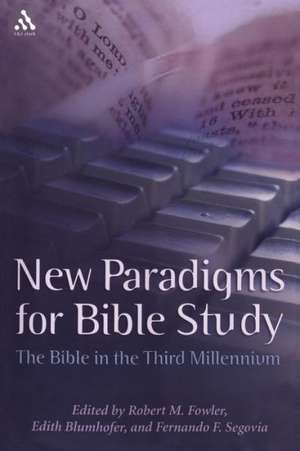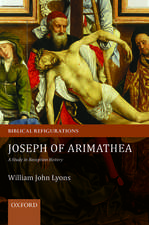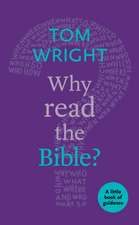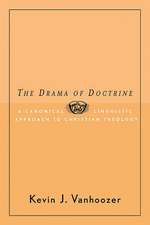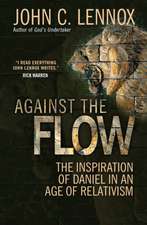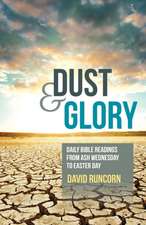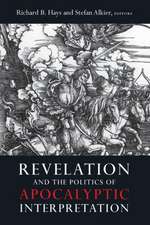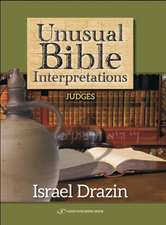New Paradigms for Bible Study: The Bible in the Third Millennium
Editat de Robert M. Fowler, Edith Blumhofer, Fernando F. Segoviaen Limba Engleză Paperback – 31 aug 2004
Preț: 260.25 lei
Nou
Puncte Express: 390
Preț estimativ în valută:
49.83€ • 51.89$ • 41.34£
49.83€ • 51.89$ • 41.34£
Carte tipărită la comandă
Livrare economică 14-28 februarie
Preluare comenzi: 021 569.72.76
Specificații
ISBN-13: 9780567026606
ISBN-10: 0567026604
Pagini: 304
Dimensiuni: 160 x 229 x 20 mm
Greutate: 0.5 kg
Ediția:New.
Editura: Bloomsbury Publishing
Colecția T&T Clark
Locul publicării:New York, United States
ISBN-10: 0567026604
Pagini: 304
Dimensiuni: 160 x 229 x 20 mm
Greutate: 0.5 kg
Ediția:New.
Editura: Bloomsbury Publishing
Colecția T&T Clark
Locul publicării:New York, United States
Recenzii
"This book is highly recommended as an up-to-date survey of the place of the Bible in contemporary Christianity, including the impacts of technology such as the Internet, CD-ROMS, and hypertext."- Bible Editions and Versions, January 2006, pg.24-25
'those wanting to think seriously about how to encourage engagement with Scripture in the (post)modern world will find plenty to stimulate'
'...the book's scope is considerably broader than its title and subtitle suggest. It covers a wide variety of different ways in which people might engage with the Bible, not just issues to do with studing the Bible; and it looks backwards into the early twentieth century (and beyond), not just forward into the new millenium...But those wanting to think seriously about how to encourage engagement with Scripture in the (post)modern western world will find plenty to stimulate - and also much to infuriate - then.' volume 22, number 3, 2005
The Bible is more than a text; it is an object to be honored and one to be taken apart and put back together, a tool of imperialism and of anti-colonialism, something to explore and something to be marketed. All those interested in the future of the scriptures -- especially students and educators of all sorts -- will find much in New Paradigms for Bible Study to spark their imaginations and enlarge their frame of reference. L. William Countryman, Sherman E Johnson Professor in Biblical Studies, Church Divinity School of the Pacific, and author of Interpreting the Truth: Changing the Paradigm of Biblical Studies
1. These essays listen to the questions and answers of "past" methods of Bible study but impatiently, cautiously, and curiously seek new questions and answers in an effort to discern the new challenges before all thoughtful readers of the Bible. 2. Authors from diverse religious and theological perspectives seek "new paradigms" for studying the Bible mindful of the role of new technologies and global perspectives without dismissing the past as a failure. 3. A thoughtful collection of essays for anyone interested in reading interpreters of the Bible who are aware of the contemporary debates surrounding the impact of a) technology on understanding these sacred texts and b) listening to impatient voices wishing to share their perspectives. 4. "New Paradigms" gives readers insight into ways they will need to adjust their perspectives on these ancient texts without utterly dismissing some of the faithful readings of past generations. Kent Harold Richards, Professor of Old Testament and Executive Director Society of Biblical Literature
'...crisply written and varied' Volume 116, Number 11, Pages 338-339
'it stimulates us to think about various possibilities for the directions which Bible study may take in the foreseeable future, and that the questions which it raises are likely to be with us longer than the answers which it suggests.' ~ Gerald Bray, Theology, Jan/Feb 2006
'those wanting to think seriously about how to encourage engagement with Scripture in the (post)modern world will find plenty to stimulate'
'...the book's scope is considerably broader than its title and subtitle suggest. It covers a wide variety of different ways in which people might engage with the Bible, not just issues to do with studing the Bible; and it looks backwards into the early twentieth century (and beyond), not just forward into the new millenium...But those wanting to think seriously about how to encourage engagement with Scripture in the (post)modern western world will find plenty to stimulate - and also much to infuriate - then.' volume 22, number 3, 2005
The Bible is more than a text; it is an object to be honored and one to be taken apart and put back together, a tool of imperialism and of anti-colonialism, something to explore and something to be marketed. All those interested in the future of the scriptures -- especially students and educators of all sorts -- will find much in New Paradigms for Bible Study to spark their imaginations and enlarge their frame of reference. L. William Countryman, Sherman E Johnson Professor in Biblical Studies, Church Divinity School of the Pacific, and author of Interpreting the Truth: Changing the Paradigm of Biblical Studies
1. These essays listen to the questions and answers of "past" methods of Bible study but impatiently, cautiously, and curiously seek new questions and answers in an effort to discern the new challenges before all thoughtful readers of the Bible. 2. Authors from diverse religious and theological perspectives seek "new paradigms" for studying the Bible mindful of the role of new technologies and global perspectives without dismissing the past as a failure. 3. A thoughtful collection of essays for anyone interested in reading interpreters of the Bible who are aware of the contemporary debates surrounding the impact of a) technology on understanding these sacred texts and b) listening to impatient voices wishing to share their perspectives. 4. "New Paradigms" gives readers insight into ways they will need to adjust their perspectives on these ancient texts without utterly dismissing some of the faithful readings of past generations. Kent Harold Richards, Professor of Old Testament and Executive Director Society of Biblical Literature
'...crisply written and varied' Volume 116, Number 11, Pages 338-339
'it stimulates us to think about various possibilities for the directions which Bible study may take in the foreseeable future, and that the questions which it raises are likely to be with us longer than the answers which it suggests.' ~ Gerald Bray, Theology, Jan/Feb 2006
